
Poetry is, like any writing, a tool in the hand of the poet, and at times, can be used as a weapon in the hand of a crusader. It has often been said that “The pen is mightier than the sword” but this does not only apply to declarations and constitutions. Poems too have the power to change the world and advance the causes which great men and women champion proudly. Few great poets in American history have written poetry for poetry’s sake. Most have written poems as a medium of communication, putting into words profound truths and difficult emotions. None of them compare to the crusading and poetic ambition of John Greenleaf Whittier. Whittier is my favorite poet precisely because he was more than a poet, he was a passionate friend and defender of justice and a committed abolitionist who used his writing as a means to communicate his love for the cause of freedom and his contempt for tyranny.
Born in 1807, in Haverhill, Massachusetts, Whittier was raised in a Quaker home and taught to love justice and to hate slavery. His despise of the peculiar institution is unmistakably clear as one reads his poetry. Poems such as “Massachusetts to Virginia” indicate Whittier’s high ideal of freedom and his contempt for slavery. More than his words, however, his actions spoke for him as well. He was a protege of the great abolitionist William Lloyd Garrison and championed the cause of abolition with his life. He ran unsuccessfully for Congress in 1832 but remained actively involved in politics as a lobbyist and political organizer. He was a founder of the Liberty party, which evolved into the Free-Soil party which became incorporated into Abraham Lincoln’s Republican party. Despite his fame for his excellent poetry, Whittier considered his signing of the Anti-Slavery Declaration of 1833 to be the high point of his life and the essence of his legacy. Whittier was actively involved in the 1860 and 1864 Presidential elections, serving as an elector. He voted twice for Lincoln.
John Greenleaf Whittier tirelessly supported abolition and he radically called for full and immediate emancipation. In 1850, Daniel Webster voted for the Compromise of 1850 and Whittier, feeling betrayed by the Massachusetts Senator by what he considered an “inglorious” compromise, wrote one of his most famous poems: Ichabod! (Click here to read my post about “Ichabod!” and the context of its writing.) Many of Whittier’s other well-known poems have political themes. “Barbara Fretchie” is a patriotic tale of a brave Unionist woman who refuses to pull down her American flag when Confederate troops march into her town.
Whittier’s poem are the most memorable thing about him today but it seems many have forgotten his political and social contributions. He was become another name, another boring poet, another crafter of verse, devoid of character and substance. Whittier’s greatness lies not as much in his poetic talent as it does in how he used his poetic talent. Whittier lived and worked in the spirit of 1 Peter 4:10 which reads, “As each has received a gift, use it to serve one another, as good stewards of God’s varied grace”. His life and life’s work were defined by a love for God, a passion for liberty and justice and a committment to be a good steward of his poetic talents.
